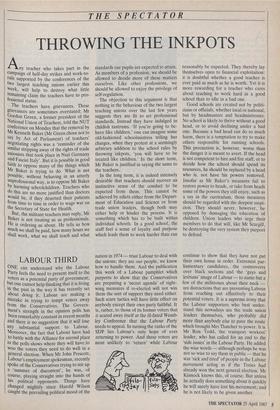THE SPECTATOR
THROWING THE INKPOTS
Any teacher who takes part in the campaign of half-day strikes and work-to- rule supported by the conferences of the two largest teaching unions earlier this week, will help to destroy what little remaining claim the teachers have to pro- fessional status.
The teachers have grievances. These grievances are sometimes overstated: Mr Gordon Green, a former president of the National Union of Teachers, told the NUT conference on Monday that the removal by Mr Kenneth Baker (Mr Green chose not to say by Act of Parliament) of teachers' negotiating rights was a 'reminder of the similar stripping away of the rights of trade unionists that took place in Nazi Germany and Fascist Italy'. But it is possible in good faith to oppose many of the things which Mr Baker is trying to do. What is not possible, without behaving in an utterly unprofessional way, is to oppose Mr Baker by harming schoolchildren. Teachers who do this are no more justified than doctors would be, if they deserted their patients from time to time in order to wage war on the Secretary of State for Health. But, the militant teachers may reply, Mr Baker is not treating us as professionals. He is ordering us about. He tells us how much we shall be paid, how many hours we shall work, what we shall teach and what standards our pupils are expected to attain. As members of a profession, we should be allowed to decide more of these matters ourselves. Like other professions, we should be allowed to enjoy the privilege of self-regulation. The objection to this argument is that nothing in the behaviour of the two largest teaching unions over the last few years suggests they are fit to set professional standards. Instead they have indulged in childish tantrums. 'If you're going to be- have like children,' one can imagine some old-fashioned schoolmistress telling her charges, when they protest at a seemingly arbitrary addition to the school rules by throwing inkpots, 'you will have to be treated like children.' In the short term, Mr Baker is justified in saying the same to the teachers.
In the long term, it is indeed intensely desirable that teachers should recover an instinctive sense of the conduct to be expected from them. This cannot be achieved by edicts either from the Depart- ment of Education and Science or from trade union leaders, though both may either help or hinder the process. It is something which has to be built within individual schools. In a good school, the staff feel a sense of loyalty and purpose which leads them to work harder than can reasonably be expected. They thereby lay themselves open to financial exploitation: it is doubtful whether a good teacher is ever paid as much as he is worth. Yet it is more rewarding for a teacher who cares about teaching to work hard in a good school than to idle in a bad one.
Good schools are created not by politi- cians or officials, whether local or national, but by headmasters and headmistresses. No school is likely to thrive without a good head, or to avoid declining under a bad one. Because a bad head can do so much harm, there is a temptation to try to make others responsible for running schools. This precaution is, however, worse than the danger it is meant to avert. If the head is not competent to hire and fire staff, or to decide how the school should spend its resources, he should be replaced by a head who is, not have his powers removed. Insofar as Mr Baker's measures fail to restore power to heads, or take from heads some of the powers they still enjoy, such as a say in the curriculum, those measures should be regarded with the deepest suspi- cion. They should never, however, be opposed by damaging the education of children. Union leaders who urge their members to do that will, like Mr Scargill, be destroying the very system they purport to defend.


































































 Previous page
Previous page